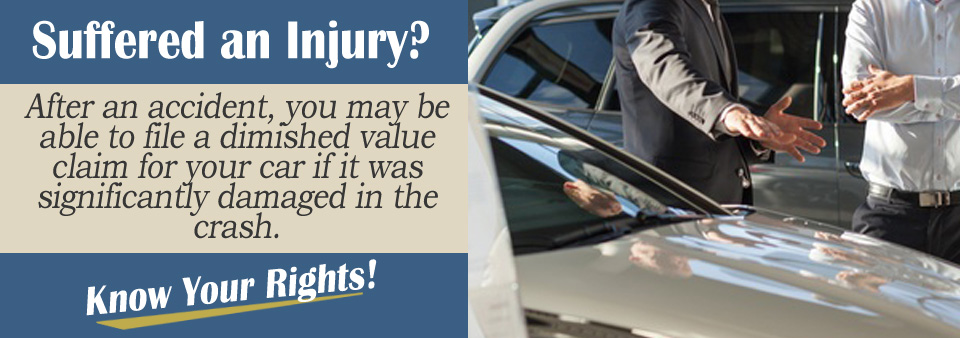Once a car is in an accident, even if the outward appearance of the car appears to be the way it was before, it will never be the same again. Many times, the resale value of the car is also negatively affected which causes even more problems for the victim of the car accident.
How does this affect your car insurance claim? Can you recoup any losses sustained to your resale value in your claim?
We have asked attorney, Alaina Sullivan, about claims and car resale value. Here is what she had to say about this typle of situation:
Vehicle History
Why does the accident matter when it comes to your car’s value? The importance lies in the fact that accidents are supposed to be reported to insurance providers no matter what, and once they are, they go on the official record of the car.
The CARFAX Vehicle History Report is an excellent example. Buyers can access information on the car so that they can be sure they have all information they need before purchasing a car.
No one wants to discover that the car had extensive body damage after the fact, and unfortunately, the seller’s word cannot be taken as the only truth. Many times, cars will be discounted because of the history they have with respect to accidents.
A car that has been in an accident but is the same model as another car may be less in value because of the fact that the car has been damaged previously. It is important this information is known and disclosed when purchasing or selling a car.
Loss of Value or Diminished Value
Loss of value or diminished value makes up for this reduction in value of the car following a car accident. This figure is the difference between the market value of the car without the accident in its history and the market value of the same car with the accident history.
Many people correlate it to depreciation, but depreciation takes into account loss in value that is anticipated and should naturally occur over time.
On the other hand, loss of value or diminished value occurs unexpectedly due to something that was not anticipated, such as an accident. Unlike depreciation, loss of value or diminished value can be recouped in a damages claim following a car accident.
How to File a Diminished Value Claim
The first step you should take before filing a diminished claim is to get your car appraised and evaluated to see just how much your car has diminished in value. Also, get an appraisal on what your car would have been valued at prior to the accident given the condition it was in.
It may not be valued at what a brand-new car of that model would have been, but try your best to account for how your car was before it was in the accident.
Second, if you live in an at-fault state, contact the other party’s insurance provider and request compensation specifically for diminished-value. Provide the proof you have obtained on the values of the car, before and after, and a police report, as well, if possible.
If you live in a no-fault state, you will need to contact your insurance company to see how best to proceed. Depending on your coverage, you may be able to make a diminished value claim under your own policy.
If the other driver was uninsured, you will need to speak with your insurance provider to see whether you have adequate cover to handle this type of claim.
If the insurance provider resists or disputes your claim, you may need to seek legal action, per your insurance contract. This may involve alternative dispute resolution or small claims court.
Contact an attorney to see how best to proceed. Many times, having an attorney on your side can be all you need to deal with the insurance company.
Contact an Attorney Today
If you have been in a car accident and have concerns about how the accident has affected the resale value of your car, it is recommended you contact an attorney to ask any questions about your case you may have. A licensed personal injury attorney will be able to evaluate your case and determine if you have a claim against the other party’s insurance company.
To receive the compensation for your medical bills, property damages, and pain and suffering, you should speak with a personal injury attorney in your area today.
